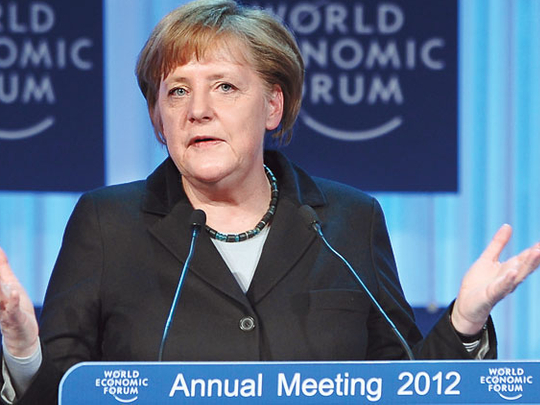
Dubai: Greece and the International Monetary Fund (IMF) said yesterday that negotiations over landmark debt deals will be concluded in a "matter of days", raising hopes that the country, along with others stricken with debt in southern Europe, will avoid a potential default.
Leading economists and analysts said yesterday that the decisions taken by European leaders on Monday were in no way a step towards resolving the crisis.
European leaders agreed on Monday on a permanent Eurozone rescue fund and most endorsed stricter budget discipline. Europe's long-term financial challenges are being addressed through stronger fiscal union, agreement on overall debt reduction and longer-term funding to restructure sovereign debts of countries in distress.
"This EU summit was hardly a game changer — just another exercise in buying time. Fortunately for the EU politicians, the European Central Bank (ECB) continues to pick up the tab. But this won't last forever," Steen Jakobsen, chief economist at Saxo Bank, told Gulf News yesterday.
Beyond rescue
Despite the huge sums of money being pumped in by the ECB through its short-term bond buying programme, economists yesterday said Greece was beyond rescue and it is in its own interests — as well as that of other southern European countries — to default and take a break from the common currency until its economic health is restored.
"The whole of southern Europe will eventually leave the Eurozone due to a general lack of competitiveness, with Greece and Portugal first in line for exit," John Greenwood, chief economist at Invesco, told Gulf News yesterday.
Greenwood said Portugal would be the next to leave the common currency, with state, company and household debt pushing the country into default. He said history shows that the crisis of the magnitude that southern Europe faces today is dealt with through steps involving reduction in short-term debt, structural reforms through austerity programmes and a drastic devaluation of the currency.
While Greece and other southern European nations are already going through the first two steps, Greenwood — who helped to reform Hong Kong's currency after its collapse in the 1980s — said absence of currency devaluation will make their path to recovery next to impossible as these countries are hugely uncompetitive.
"Greece is technically already in default — a 50 per cent haircut is, in effect, a default. Unit labour costs in all these countries are about 30 per cent higher than in Germany. If those countries had their own currencies, they would devalue them by that factor," Greenwood said.
Saxo Bank's Jakobsen said a renewed crisis in the EU is inevitable as the leaders of the bloc have failed to address the fact that a sovereign debt crisis is one of solvency and not liquidity provision, and the growth outlook for Europe is mostly negative.
Both economists have said the German-backed idea of "prosperity through austerity" is not going to solve the European crisis in the near future.
March a crucial month
Greece could exit the euro as early as March, believe economists.
Speaking to Gulf News, John Greenwood, chief economist at Invesco, said he anticipates other southern Eurozone countries to follow suit. Agreeing with him was Steen Jakobsen, chief economist, Saxo Bank, who also expects Europe to be thoroughly punished by the markets by June this year.
"The 19th non-solution EU Summit was yet another exercise in futility as we march towards the inevitable," Jakobsen said.












